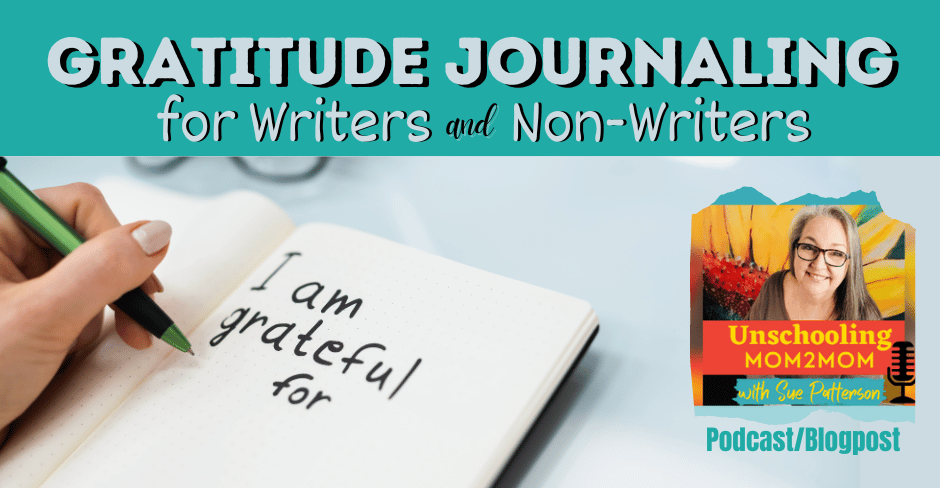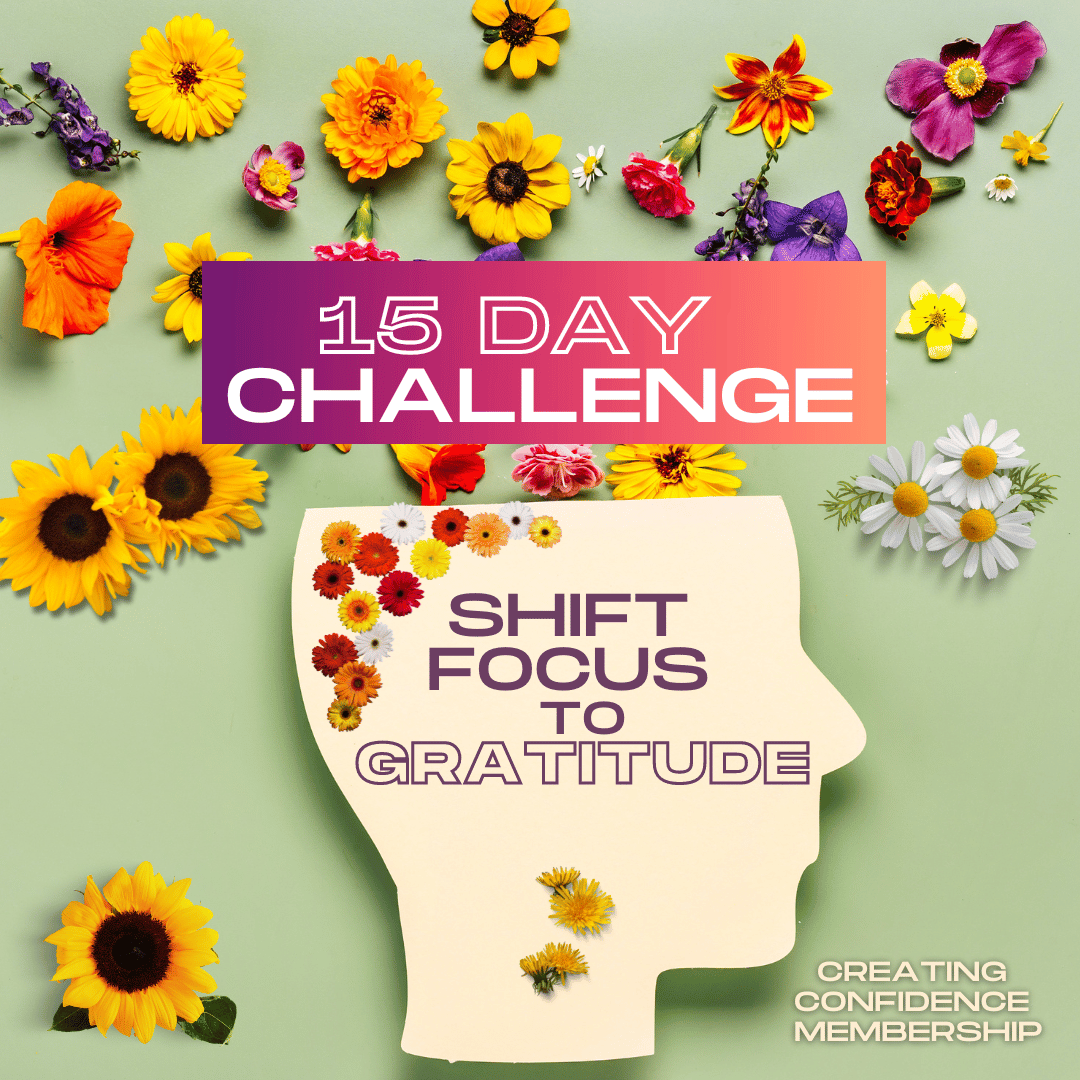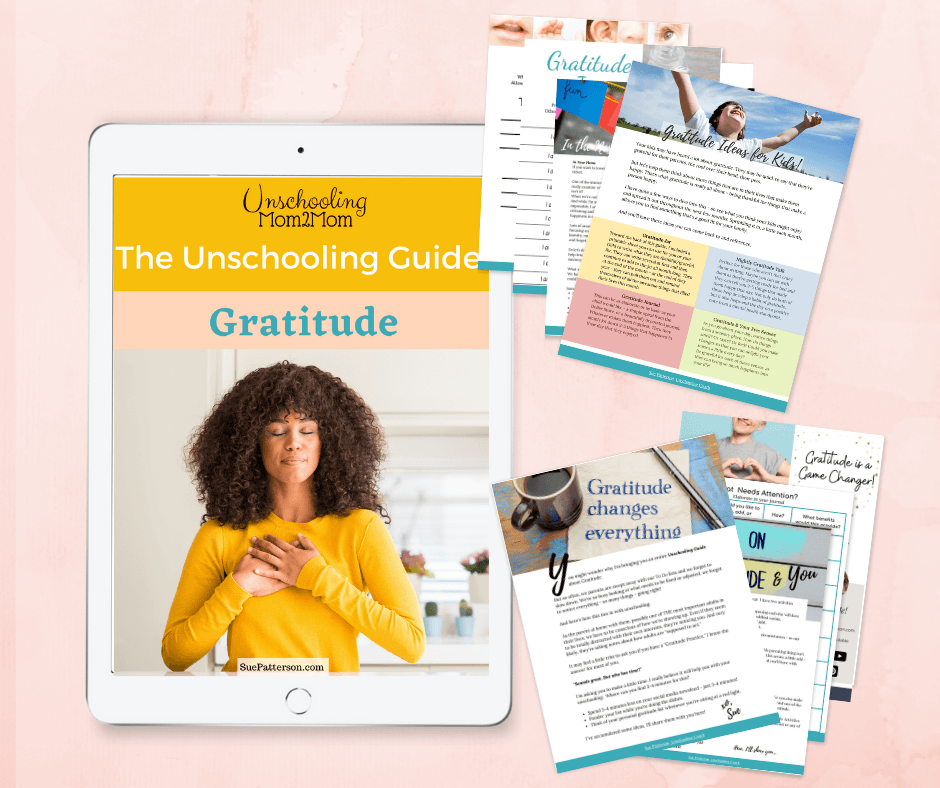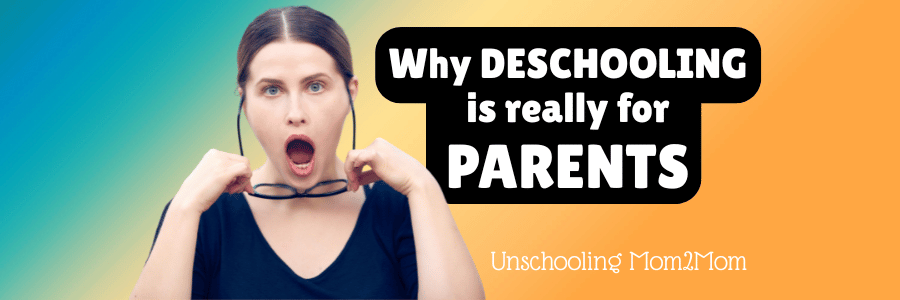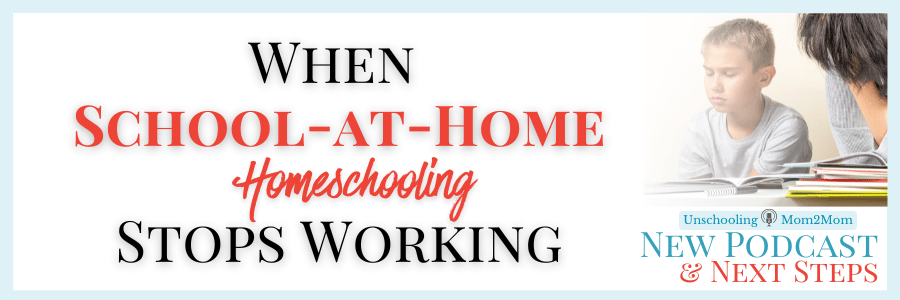Gratitude Journals, Unschooling, Ideas for Parents
November is the month
a lot of people focus on the benefits of Gratitude.
Creating Gratitude Journals is one of the most popular tools.
Some of our kids may love to write and journal while others... not so much!
This podcast is all about seeing the different ways we can use the concept of Gratitude Journals
- whether your kids are writers or
not!
The world can bombard us with negatives: frightening news events, inconsiderate people, disappointing interactions.
But research is showing that
cultivating a sense of gratitude can help us refocus so we can remind ourselves of the good things happening in our life right now.
Establishing a daily practice of identifying
“What Went Right Today?”
and feeling thankful for it, can do wonders for our happiness and health.
Let’s help our kids figure out how to do this too.
One of the first things that pops up when you decide to Google,
"Creating a Gratitude Practice" is journaling.
But as many of us know, some of our kids are NOT into that. Heck, some PARENTS are not that into it either! After years of the school approach to writing, many of us are left thinking we're not good writers or that we "hate writing!" It's always odd to me how many parents who feel this way go on to duplicate the same methods with their kids - and :::surprise! surprise!::: their kids hate writing now too! Or... maybe you were GOOD at writing in school. Maybe your own learning style aligned with the methods being used or maybe you just learned to hack the system. But your kids are completely different little people and they're not enjoying your writing suggestions at all.
You know me, I'm going to be realistic.
I want to talk to you about ways you can do gratitude journals or create a gratitude practice for writers and non-writers!
And even our technology lovers!
But before we list out a few ideas, lets talk about WHY this works. When you use the school approach, the subjects are the focus. You learn Math and Reading and Writing. But that's too vague to really excite the kids about learning those things. Better to look at something they or you want to DO and then see what skills a person needs to be able to do it. That's the way unschooling works.
If I were to say,
"let's spend a little time writing. It will help you get better at it."
That's not going to fly if your kids have embraced the idea that learning happens organically.
Better to say,
"let's color these superheroes!" (knowing this will strengthen those fine motor skills)
or
"let's make a sign for your door" (showing them the usefulness of writing)
or
"let's write a thank-you note to grandma" (because it's a common courtesy - plus she loves those and it keeps the gifts coming! lol)
Here are some fun MadLibs way to do this!
See the difference?
Just because your child isn't into writing - mine took all different paths to become comfortable with writing - we don't want to forego the benefits of focusing on gratitude just because of that! I can give you more resource links to help you understand more about the unschooling approach to writing:
Read Boys and Writing or Unschooling and Writing (also a podcast)
Over in my
membership group, we're doing a
15-Day Gratitude Challenge (this podcast/blogpost is Day 3). We're talking about all the benefits that can come when we focus on gratitude. If you want to see more about what we're doing, you can hop over to YouTube here:
So let's look at what we can learn from the idea of Gratitude Journals,
maybe writing if our kids enjoy it or maybe getting creative for our kids who don't!
Our entire attitude is affected by what and where we choose to focus. Hasn’t everyone had the experience where all was well until ONE person did or said ONE negative thing? And then all the good was tossed out the window and replaced with an overwhelming feeling of discontent? So, instead of being swept away by the squeaky wheels in our lives, let’s get back in the driver’s seat. Let’s deliberately pull the positives to the front of our minds.
Kids need tools to help them cope with rough patches that inevitable pop up throughout life. Gratitude journals are a simple way to possibly set some new patterns.
Setting aside a little time to recall moments of gratitude associated with our daily life can help create a life filled with gratitude and thankfulness.
Maybe some quiet time with Mom or Dad remembering a few positive things from their day?
- Did something happen today that they handled well?
- Did someone say something that made them happy?
- Did they experience something exciting or see something new?
For Kids Who Like to Write...
- Artistic types might like to create a beautiful inspiring cover. Hobby stores will offer a variety of notepad styles.
- DIY Artists may use notepads that have art paper – they can draw representations of what inspired their gratitude that day.
- Less-artistic yet thoughtful types may choose simple pocket calendars designed with weekly options. They can write their daily gratitudes onto a calendar.
- The Simplest Solution is to grab a cheap spiral from the local dollar store and use it only for your gratitude recordings.
Encourage them to write about what they're thankful for.
There’s no right or wrong way to create a gratitude journal – whatever works best for you is your answer. Record somewhere between 3-5 things you’re grateful for on that particular day.
People/relationships, comforts in the home, pets, skills they've acquired are good starting places. Maybe picking a topic each day - lists of favorite things they're grateful to have or grateful exist in the world.
Once they've made the list, invite them to think about what they've included and write about what each of these items offers them in their lives - how do each make them feel? Bringing these positives into their awareness will help shift their mindset to what good exists in their lives.
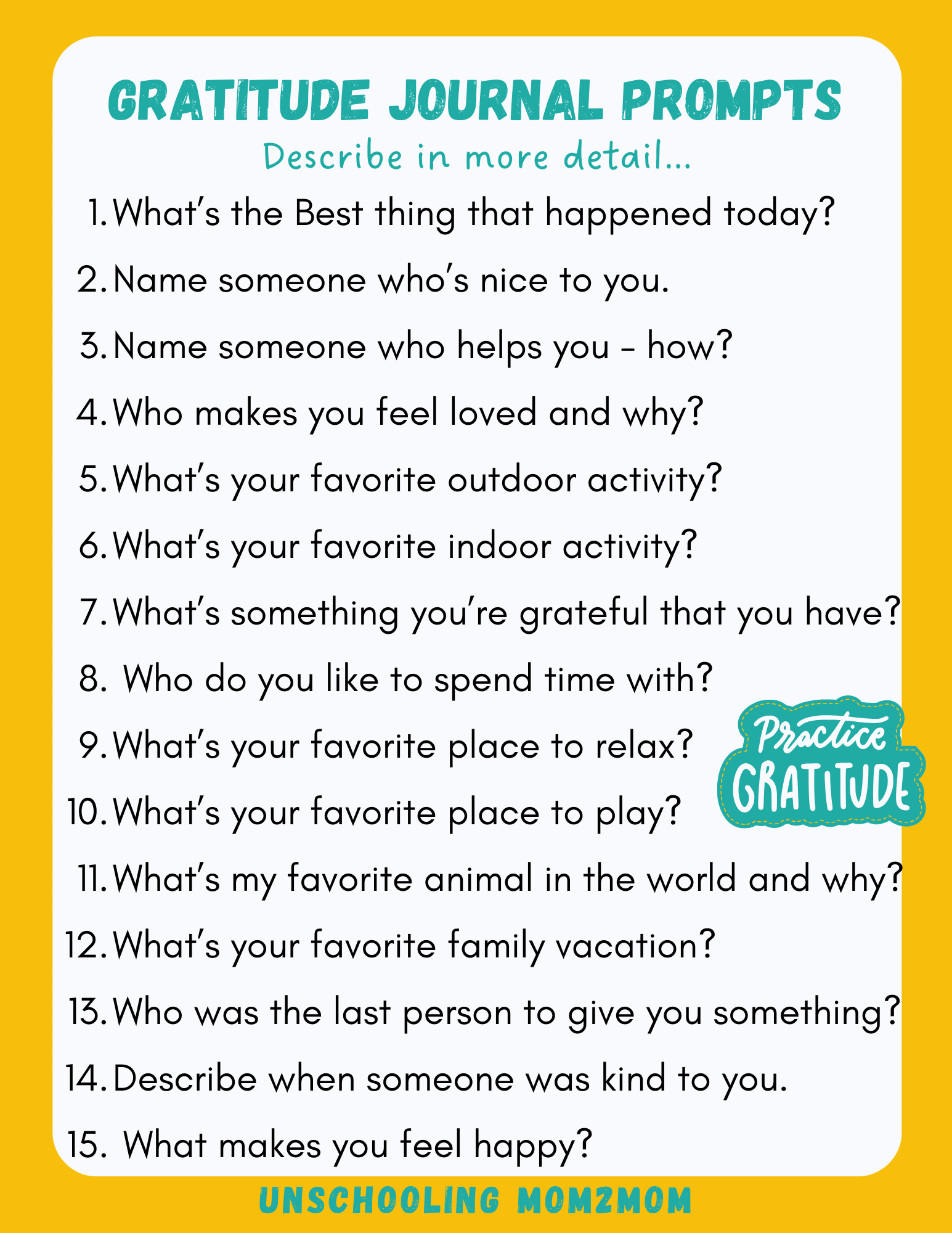
For Kids Who DON'T Like to Write...
Conversations Count! Those same ideas mentioned above can happen conversationally. Maybe over a meal, in the car, or a few minutes before bed. Think of it as creating a new habit, a new family tradition!
- 3 Good Things - invite them to think about three good things that happened to them that day. Tell them that it's a good habit to focus on the positive so as the day progresses, think about whether something that happened could be included in their own 3 Good Things today! If this is hard for them, invite them to walk through the day, thinking in detail about what happened. Help them ponder how the day went - from start to finish. Help them get as detailed as they can. If they wander over to what went wrong, guide them back for now, to focus on what went right. After walking through the entire day, list at least three things to be grateful for.
- Anything you see as a Journal prompt can be used as a "conversation prompt." Remember, the priority is to focus on gratitude, not on the lack of writing! They're two separate issues!
Dictation. We did this a lot with creative writing, but it can easily be used in a Gratitude Journal format.
- Non-writers can get journals too! They can still pick out a cool looking journal - without the pressure of knowing you're going to make them "work on writing." You're going to do the writing for them! They'll just tell you what to write for them. This allows their thoughts to flow without worrying about choosing words they can spell or the shape of the letters. That can come later.
- Use a big Whiteboard. You can do the writing and they can decorate the words. Or just notice the things they're grateful for every time they pass by. Meet there every day to add more.
Gratitude Ideas at Pinterest. The Unschooling Mom2Mom Pinterest board has a ton of ideas to try that could inspire your kids toward more gratitude!
- Scavenger Hunt ideas
- Thankfulness Walls or Trees
- Games to play
Techy Kids Who Prefer Apps...
If your kids are into apps, this is another way to connect with them over something they enjoy AND help them focus a little more on Gratitude.
- Evernote or apps that allow pictures in folders can be used to record daily gratitude
- Create a digital scrapbook. You could even make a Family Instagram (yes, you can make it private) and post pictures of things that happen in the day that each person is grateful for. Give everyone access and your account will be FILLED with daily gratitude photos - maybe even more! Or you could make a Gratitude Group Text for photo sharing if you don't want to tap into social media.
- Try an app DESIGNED for Gratitude and/or journaling, like:
- 365 Gratitude Journal (free)
- Take 2 Minutes (subscription, but seems cool!)
- Grateful (photo journal app)
Try this for a month with the whole family.
See for yourself if it changes everyone’s trajectory. 🙂
Hopefully this helps you see that a Gratitude Journal is awesome if you have big writers - but not to be overlooked if you don't!
And here’s a quick video from the Greater Good Science Center about teaching gratitude to children.


